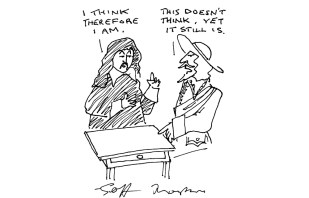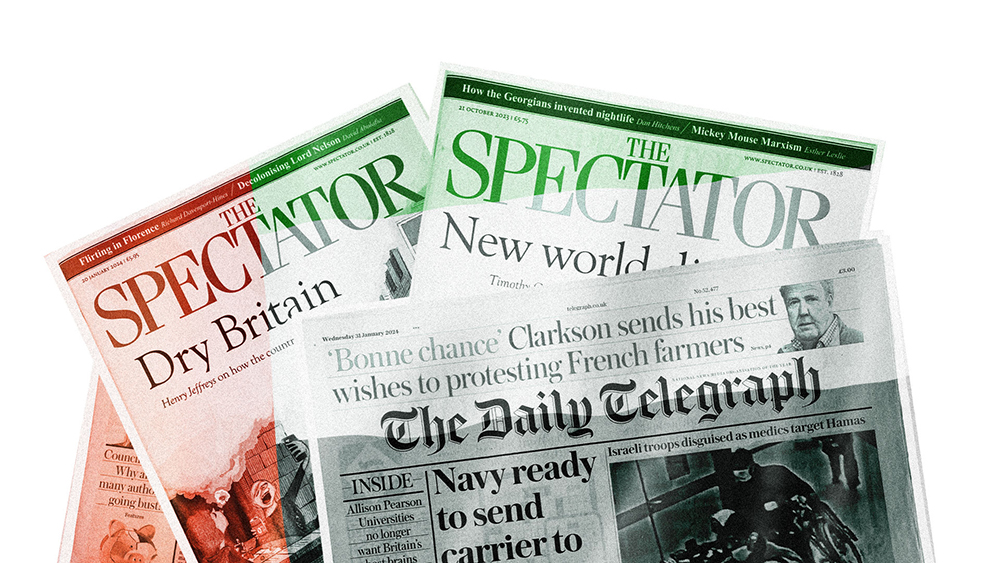Should the Emirati government be allowed to buy The Spectator and the Daily Telegraph? The government is considering this important question and has hinted that it may allow the sale if promises are made about editorial independence. Fine words, but what would this mean in practice? Assurances of editorial freedom mean nothing when they come from an autocracy like the United Arab Emirates. You simply cannot cross the Emirati royals: they call all the shots, down to the smallest detail. It’s the way it works. I should know.
My story starts in 2007 when France and the UAE agreed to create the Louvre Abu Dhabi, a great universal museum on Saadiyat Island. The Art Newspaper, which I co-founded in 1990, supported the plan. After September 11 (in which my daughter was caught up), it seemed to me that the more opportunities there were for the Middle East to know the West, the better, since it is harder to turn someone you know into your mortal enemy. I saw a shared language in art that can unite people at a time of political conflict.
My attitude contrasted with a froth of indignation in France, where some politicians and intellectuals were saying it would be like building an opera house in the jungle: the Arabs were too unsophisticated to appreciate such art; it was disgusting that France was taking money for culture (€400 million to be divided between the participating museums); that it would be impossible to show Christian art or nudes (in the event, untrue), and so on.

To my surprise, I was asked by Abu Dhabi to produce an edition of the Art Newspaper for the entire Arab world – from Morocco to the Gulf – with reporting from all the centres. There was, and still is, nothing like it. It was a marvellously grand idea, a mouthpiece for the creativity and heritage of all those countries, which are separated by their divergent histories and spoken Arabics, but united by literary Arabic, which is understood by all educated people.
We produced a pilot issue, in English and Arabic, under the title Akhbar al Fanun (‘News of the Arts’). The articles were commissioned for it, and the paper was received enthusiastically, so we were all set to proceed. And yes, there was no free press tradition in the Emiratis – but, I thought, isn’t the whole point of this audacious project that they want to change things? To liberalise a bit and improve how they are seen by the outside world? That was my first mistake, from which I should have learnt that even the slightest criticism was unacceptable.
My mistake was to think a free publication was ever possible under an absolutist government
Dubai announced that it was going to represent the UAE with a pavilion at the 2009 Venice Biennale for the first time. Abu Dhabi took offence. Never mind that the Emirates are supposed to be united; Abu Dhabi is the seat of government and the capital and considers itself the senior Emirate. They decided to set up a rival pavilion, and when a roaming BBC crew happened to interview me, I mentioned how interesting it was to see art from the region – but that having two pavilions was causing some confusion with the public, who had difficulty finding the UAE on the map, let alone distinguishing between Dubai and Abu Dhabi.
Would that I had never said it. The interview was used by the BBC World Service and appeared in Arabic on its website. Immediately, Abu Dhabi cut off negotiations to do with the paper and it took two or three years for us to be invited in again, at first just to report on an art scene that was developing extraordinarily rapidly. Then the Akhbar al Fanun project officially got going again, to be principally online now, because that would potentially reach millions of people.
Fast-forward to the grand inauguration of the Louvre Abu Dhabi on 8 November 2017 by Emmanuel Macron and Mohamed bin Zayed Al Nahyan, de facto ruler of Abu Dhabi and the UAE. The Art Newspaper had produced a magazine containing interviews with the French and Emiratis who were behind the creation of the museum. Although the publication was financed by the UAE, it discussed difficult issues such as the emergence of religious fundamentalism and what had gone wrong with education in the Arab world to produce such conformism.
We also filmed video interviews with Emirati ministers, artists and leaders of the local art world about which of the works of art they liked best and what they hoped the museum would achieve. I was invited to chair the first meeting in the museum’s lecture theatre, with top gallery directors and VIPs from all over the world present, to take place the day after the opening.
But I had made another mistake. I had thought we should provide some context so we had published two articles in the London edition of the Art Newspaper. The first was a factual account of that year’s PwC report (commissioned by Abu Dhabi itself) on the working conditions of the South Asians who had built the museum, which boiled down to ‘Getting better, but still not ideal’. The second article was a review of a book which revealed it was arms-sale offsets – contributions to the local economy by countries selling arms to the UAE – that had enabled the Crown Prince to get the Louvre Abu Dhabi project off the ground.
That was it. My hotel telephone rang early in the morning: ‘Your services are no longer required,’ I was told. From then on I was a non-person. A very senior Lebanese in the Department of Culture and Tourism was appalled and arranged for me to meet its director-general. I tried to explain to him that if one wrote unalloyed praise, no one believed a word of it. Turkish carpets are woven with a deliberate flaw in the design because only God is perfect, etc etc. But he just stared at me.
I do not know whom I offended to the point where they cancelled a project that had been so eagerly awaited in the region (perhaps the Crown Prince himself, or a zealous flunky) but I will never be certain because I never heard from Abu Dhabi again. So just one issue of Akhbar al Fanun exists. Sometimes I look at it sadly and wonder if it would ever have been possible to do an honest, free-thinking publication with such owners. And given the Emirati royals reacted so drastically to such minor criticism, what fate would befall journalists in papers they own who make far more potent points?
My mistake was to think a free publication was ever possible under an absolutist government. I am breaking my silence because I hope it will nudge the UK government towards this fairly obvious conclusion: it must not fall for the promise that some formal independent board will remove this risk. What happened to me in the relatively herbivorous milieu of art will apply ten times over in the savage world of politics, conflict and finance.
This article is free to read
To unlock more articles, subscribe to get 3 months of unlimited access for just $5







Comments
Join the debate for just £1 a month
Be part of the conversation with other Spectator readers by getting your first three months for £3.
UNLOCK ACCESS Just £1 a monthAlready a subscriber? Log in